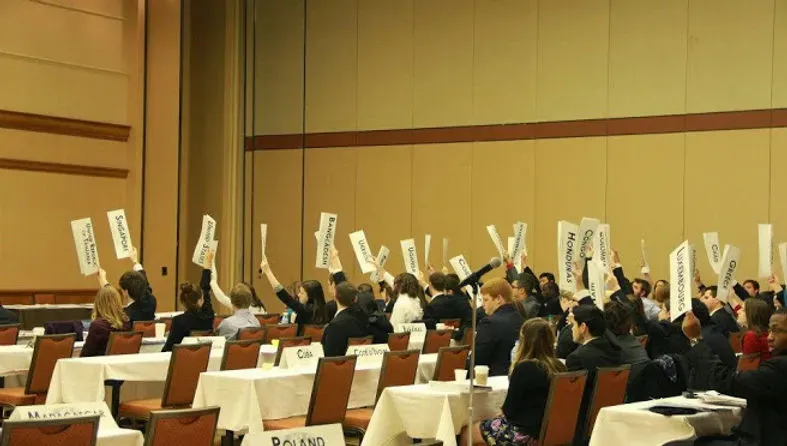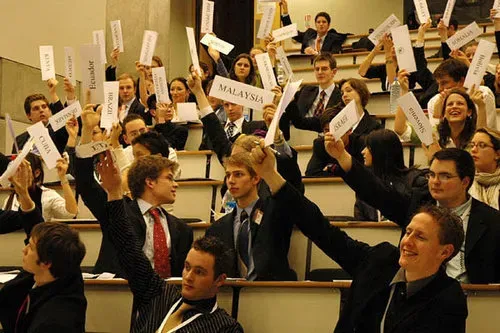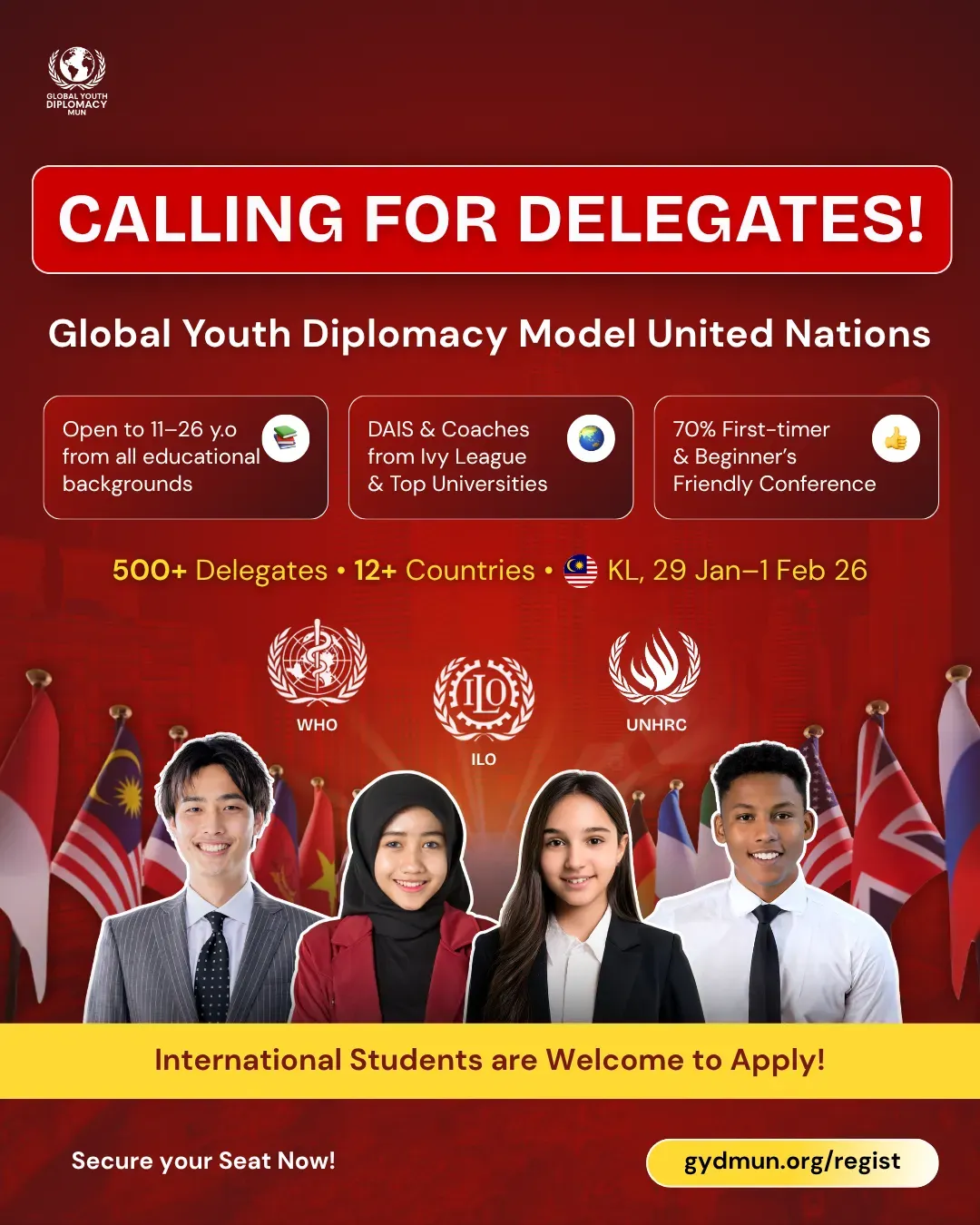When joining a Model United Nations (MUN) conference for the first time, you’ll encounter many diplomatic terms that might sound confusing at first.
These diplomatic terms are essential for understanding the flow of debate and engaging in formal discussions.
Knowing the meanings behind common MUN terms will help you communicate confidently and participate effectively.
Here’s a quick starter list to help you get familiar before your first conference.
List of MUN Terms

These MUN terms will be used throughout every stage of the conference. Make sure you understand their meanings so you can follow the discussions and participate confidently. Below is the MUN dictionary you should know:
a. Basic MUN Terms
These are the general MUN vocabulary you must know to get started:
- Delegate: A participant who represents a country in an MUN committee.
- Head Delegate: The leader of a delegation, often also the head of their MUN club.
- Delegation: A group of delegates from the same institution, assigned to represent one or several countries.
- Delegate Pack: A welcome kit provided by the conference, usually containing a handbook, schedule, map, and stationery.
- Position Paper: A short summary of a country’s stance and proposed solutions.
- Placard: A country name sign used to vote or signal during sessions.
- Simple Majority: More than half of the votes in favor.
- Floor: The current topic or speaker being discussed.
- RoP (Rules of Procedure): The official rules guiding debate and voting
- Out of Order: An action or statement that goes against the Rules of Procedure.
- Debate: The formal discussion among delegates on the agenda topic.
- General Speakers’ List: The order of delegates who will deliver formal speeches during debate.
- Global Goals (SDGs): The 17 UN goals addressing poverty, inequality, climate change, and peace. MUN topics and resolutions often align with these objectives.
- Secretariat: The organizing body of a Model United Nations conference, responsible for all logistical, administrative, and procedural aspects of the event.
Read More: 20+ MUN Phrases You Need to Know as a Delegate and Chair
b. Conference Terms
The conference is led by officials like the Chair, while participants serve as delegates in various committees. Here are key MUN languages to help you understand the hierarchy:
- Chair/Chairperson: The official who leads leads the committee and ensures rules are followed.
- Dais: The area where the Chair and staff sit.
- Student Officer: A trained delegate or member of the Secretariat who serves as part of the Dais to facilitate debate during the conference.
- Board of Dais: The group of officials (Chair, Co-Chair, and Rapporteur) responsible for running the committee.
- Gavel: A wooden hammer used by the Chair to maintain order or mark the start/end of sessions.
- General Assembly (GA): The largest committee where most countries debate broad global issues.
- Specialized Committee (or Regional Body/Bloc): Smaller committees focused on specific regions or topics.
- Secretariat: The organizing team responsible for managing the entire conference.
- Secretary-General: The head of the Secretariat and overall leader of the conference.
- Under-Secretary-General (USG): Works under the Secretary-General, often leading specific departments such as academics, logistics, or chairing.
- Board of Directors: The main organizing body that handles program coordination.
- Conference Staff: The supporting team that assists everything during the event.
c. Inquiries and Points
These MUN terms are used when delegates need to ask questions, clarify procedures, or address issues during the conference.
- Point: A general term for raising a question or calling the Chair’s attention to something.
- Point of Inquiry: A question to the Chair about rules or unclear procedures.
- Point of Information: A question from one delegate to another, usually after a speech, for clarification.
- Follow-Up: A request to ask an additional question after a Point of Information.
- Point of Personal Privilege: Raised when a delegate faces personal discomfort, such as temperature, noise, or needing a break.
- Point of Order: Used to call out violations of the Rules of Procedure.
- Right of Reply: Allows a delegate to respond to an insult or misrepresentation, if approved by the Chair.
- Point of Entertainment: An informal point used in some MUNs for mood-lifting activities with the Chair’s permission.
d. Starting of the Session
At the beginning of the conference, the Chair and delegates follow several formal steps to start the session. Here are the key MUN terms you’ll hear:
- Roll Call: The Chair reads country names to check which delegates are present or present and voting.
- Motion to Open Debate: A delegate’s request to officially begin discussion on the agenda.
- Setting the Agenda: Delegates decide which topic to discuss first.
- Speakers’ List: A list of delegates who will deliver opening speeches.
- Call to Order/Decorum: The Chair signals the session’s start and calls for order in the room.
- Member State: A country with full voting rights in the committee.
- Observer: A non-member entity (e.g., NGO or organization) that can speak but only vote on procedural matters.
- Quorum: The minimum number of delegates required to start debate.
- Present: Declared in roll call to attend while keeping the right to abstain in voting.
- Present and Voting: Declared in roll call to attend and commit to voting for or against resolutions only.
- Agenda Setting: The step where delegates choose which agenda topic to debate first.
e. Procedural Terms
These MUN terms are commonly used during MUN sessions to manage debate and maintain order:
- Adjourn: Temporarily suspending the session until the next meeting.
- Flow of Debate: The structure of discussion, from opening debate to drafting solutions.
- Motion: A formal request by a delegate to take a procedural action (e.g., open debate, move to caucus).
- Rules of Procedure: Official rules governing how the committee operates.
- Caucus: A break from formal debate to discuss ideas or negotiate.
f. Debate Terms
These terms are used during MUN discussions to structure speeches, manage informal debate, and control the flow of conversation:
- Yield: When a speaker gives up remaining speaking time to the Chair, another delegate, or comments.
- Informal Debate: When delegates temporarily leave the Speaker’s List to discuss or negotiate.
- Moderated Caucus: Chair-led discussion on a specific subtopic, with timed speeches.
- Unmoderated Caucus: Informal discussion where delegates move freely to collaborate.
- Consultation of the Whole (CotW): Informal discussion where the current speaker selects the next speaker until time runs out.
- Table: To postpone or suspend discussion of a topic until later.
g. Resolutions Terms
When the conference reaches the resolution-writing stage, these are the important MUN terms you’ll hear:
- Resolution: A formal document expressing the committee’s collective stance on an issue.
- Working Paper: The initial draft of ideas written by a bloc before formal submission.
- Draft Resolution: A working paper officially submitted to the Dais for review and debate.
- Amendment: A written change to a draft resolution, either friendly or unfriendly.
- Friendly Amendment: A change to a draft resolution that all its sponsors agree on.
- Unfriendly Amendment: A proposed change to a draft resolution that not all sponsors agree on.
- Preambulatory Clause: Explains the background and reasons for the proposed solutions.
- Operative Clause: Lists specific actions or solutions the resolution proposes.
- Sponsor: A delegate who contributes significantly to writing the draft resolution.
- Signatory: A delegate who supports bringing the draft resolution to debate.
- Voting Procedure: The final stage where delegates vote on amendments and draft resolutions.
Read More: 10 Best MUN Conferences in Singapore – Open to Beginners & Experienced
h. Voting Terms

At this stage, delegates vote on amendments and draft resolutions. Here are the main voting terms you’ll hear:
- Close Debate: A motion to end discussion and move into the voting procedure.
- Voting Procedure: The formal process where delegates vote on amendments and draft resolutions.
- For: A vote in favor of the resolution.
- Against: A vote opposing the resolution.
- Abstain: Choosing not to vote either for or against.
- Pass: Skipping a vote in the first round, but must vote in the second.
- Divide the Question: A motion to vote separately on selected operative clauses.
- Divide the House: Removes the option to abstain and delegates must vote either for or against.
- Vote by Acclamation: A resolution passes if no one objects; if objected, moves to a majority vote.
- Vote by Roll Call: Each country verbally declares their vote (“For,” “Against,” “Abstain,” or “Pass”).
- Vote with Rights: Allows a delegate to explain their vote after voting, usually when unexpected.
- Vote Clause by Clause: A motion to vote on each clause individually instead of the entire resolution.
- Straw Poll: A non-binding vote to gauge committee opinion before the official vote.
- Reorder Draft Resolutions: A motion to change the order in which resolutions are voted on.
i. Security Council Terms
The Security Council is one of the main UN bodies responsible for maintaining international peace and security. It has unique powers and rules that differ from other committees.
- P5: The five permanent members of the Security Council: China, France, Russia, the United Kingdom, and the United States.
- Procedural Voting: Voting on issues that do not affect real-world actions.
- Veto: The special power of a P5 member to block any draft resolution or motion. If a P5 vetoes, it automatically fails.
- Substantive Voting: Voting on matters with real-world impact, such as draft resolutions. These can be vetoed by any P5 member.
- Binding: Refers to resolutions that must be legally followed by member states; only Security Council resolutions are binding.
j. Crisis Terms
A crisis committee is a fast-paced MUN format where events constantly evolve, requiring delegates to react quickly and influence outcomes through written actions called directives.
- Crisis: A dynamic MUN format where situations change rapidly, and delegates can shape the storyline.
- Directive: A type of resolution used in crisis committees for immediate action.
- Historical Crisis: A simulation based on real events from the past.
- Futurist Crisis: A simulation set in the near or distant future, often speculative.
- Crisis Director (CD): The main organizer who oversees the crisis, sets the storyline, and manages the staff.
- Crisis Staff: The team assisting the CD, including deputy directors, backroom, and frontroom members.
- Single Cabinet Crisis: A crisis with one group of delegates working in a single room.
- Joint Cabinet Crisis (JCC): A multi-room crisis where groups interact, form alliances, or compete.
- Death: When a delegate’s character dies; they may receive a new character or role.
- Cabinet Director: Oversees one specific cabinet and approves or escalates directives.
- Backroom Staff: Handles responses to directives and manages the behind-the-scenes flow of the crisis.
- Frontroom Chair: The chair who leads the committee’s discussions and coordinates with the backroom.
- Character Bio: A summary of the delegate’s assigned role or persona in the crisis.
- Crisis Update: New developments or information shared with the committee by the backroom.
- Defection/Betrayal: When a delegate switches sides or cabinets during the crisis while keeping their character identity.
Baca juga: What Is the GYDMUN? Become a Diplomat for a Weekend!
Ready to Become a Diplomat? Showcase Your Skills at GYDMUN 2026 in Malaysia!
Have you mastered the MUN terms? Now it’s time to put your debating and diplomacy skills to the test at Global Youth Diplomat MUN (GYDMUN) 2026 in Malaysia, happening 29 January–1 February 2026!

As Asia’s #1 upcoming prestigious and beginner-friendly MUN, GYDMUN welcomes 500+ delegates from around the world with no prior experience needed.
The conference will be held for 4 days and 3 nights, with a package that includes hotel accommodation, meals, liaison officer, city tour, starter kit, and many more.
You’ll get the chance to immerse yourself as a diplomat for a weekend in Kuala Lumpur and earn 5 different certificates to boost your college and scholarship applications.
Learn more about GYDMUN:
- Guidebook: GYDMUN Guidebook
- Video Trailer: GYDMUN 2026
- Official Website: gydmun.org
Register now to secure your seat, limited slots available!

